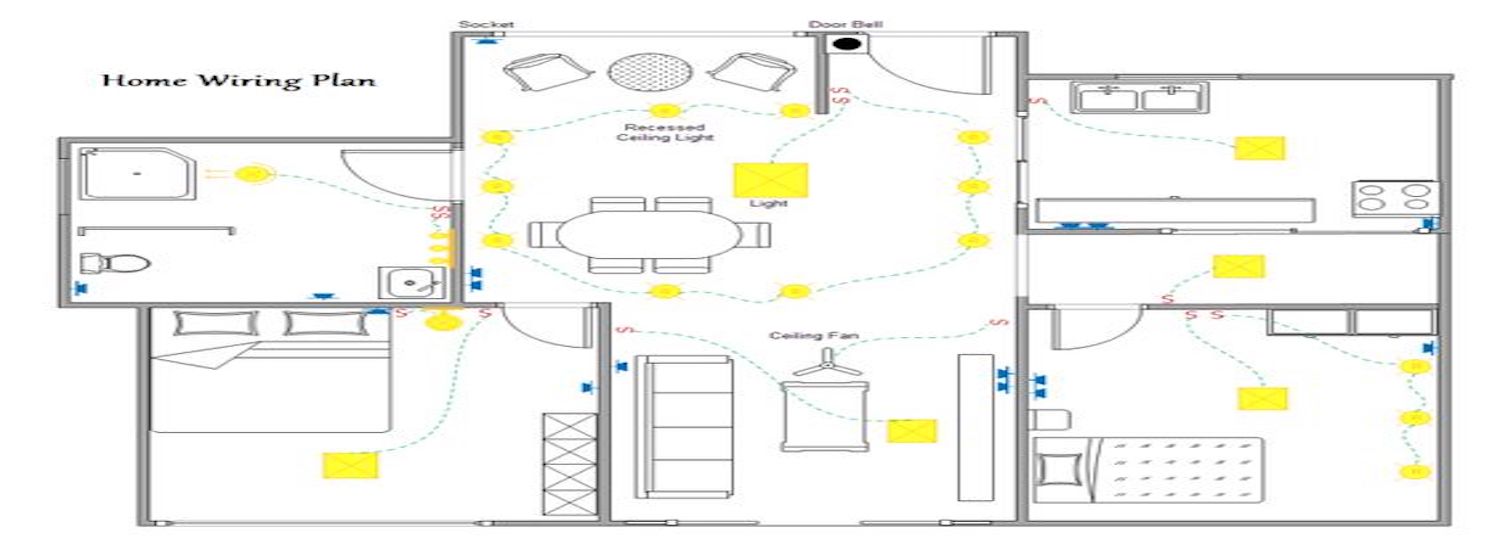Do you have to tear down walls to rewire a house?
Summary of the Article
Can a house be rewired without removing walls? The answer is usually yes, and even a whole house rewiring can be done with minimum disruption. Can you rewire a house while living in it? The short answer is yes, but it’s recommended not to move in until the rewiring is finished. Rewiring a house typically involves removing old wiring and installing new electrical wiring and all related components. Is it worth rewiring an old house? It is worth it if the current electrical system is outdated or unsafe, as it can make the home safer and more energy-efficient while increasing its resale value. How messy is a full house rewire? The majority of electrical rewires require cutting, chasing, chiseling, and can result in a lot of dust and mess. How do electricians run wires through existing walls? The process involves cutting box openings, drilling holes, threading fish tape, attaching the cable, and completing the cable run.
Now, let’s answer some questions:
Questions:
- Can a house be rewired without removing walls?
- Can you rewire a house while living in it?
- What is involved in a full house rewire?
- Is it worth rewiring an old house?
- How messy is a full house rewire?
- How do electricians run wires through existing walls?
- How long does it take 1 person to rewire an entire house?
- How many hours does it take to rewire a house?
- Does a 50-year-old house need rewiring?
- Will home insurance cover rewiring?
- How do I prepare my whole house for rewiring?
Answers:
- Yes, a house can be rewired without removing drywall. It can be done with minimum disruption.
- Yes, you can live in a house while it’s being rewired, but it’s recommended not to move in until the rewiring is finished.
- A full house rewire involves removing old wiring, installing new electrical wiring, and upgrading related components such as the consumer unit.
- It is worth rewiring an old house if the current electrical system is outdated or unsafe. It can make the home safer, more energy-efficient, and increase its resale value.
- A full house rewire can be messy as it often requires cutting, chasing, and chiseling walls. This can result in dust and require re-plastering works.
- Electricians run wires through existing walls by cutting box openings, drilling holes, threading fish tape, attaching the cable, and completing the cable run.
- The time it takes to rewire an entire house depends on the size and scope of the project, but it usually takes from 3 to 10 days.
- The number of hours it takes to rewire a house varies, but a common estimate is one hour of work per 100 square feet of wiring.
- If your home is 50 years or older, it’s likely that the wiring needs to be updated. Old wiring can fail to support modern technological demands and increase the risk of house fires.
- Your homeowners insurance may cover damaged wiring under your dwelling coverage, but certain wiring issues may not be covered, such as faulty workmanship or repair.
- To prepare your whole house for rewiring, remove carpets and old furniture as wires will run underneath floors, walls, and across ceilings.

Can a house be rewired without removing walls
As most homeowners are concerned with the disruptiveness of the process, a question electricians get a lot is “can a house be rewired without removing drywall”. The answer is usually yes, and even a whole house rewiring can in some cases be done with minimum disruption.
Cached
Can you rewire a house while living in it
Can You Live In A House While It's Being Rewired The short answer is YES. Of course, if you have just bought a house and the electrical survey noted that the property needs rewiring, then the best course of action would be not to move in until the rewiring is finished.
What is involved in a full house rewire
What Does Rewiring a House Involve Rewiring a house typically involves removing old wiring and installing new electrical wiring and all related components as follows: Electrical cables are replaced, and a new consumer unit is installed. New cabling is fitted into the walls and beneath the floors.
Is it worth rewiring an old house
Is it worth it to rewire an old house It is worth it to require an old house if the current electrical system is outdated or unsafe. Rewiring an old house not only makes a home safer and more energy-efficient, but it also can increase the home's resale value.
Cached
How messy is a full house rewire
Each property is different and some may not require the electricians to make as much mess, but the majority of electrical rewires require the walls to be cut, chased and chiselled. This can result in a lot of dust, mess and re-plastering works.
How do electricians run wires through existing walls
InstructionsCut Box Openings. With the cable routes and box locations planned, cut the openings for the electrical boxes in the drywall.Drill Holes in the Wall Plate.Locate the Drilled Hole.Thread the Fish Tape.Attach the Cable to the Fish Tape.Fish the Cable.Complete the Cable Run.
How long does it take 1 person to rewire an entire house
Depending on the size and scope of the project, it usually takes from 3 to 10 days to wire a house. A top-rated licensed electrician is your best bet. Get free, no-commitment estimates from experts near you.
How many hours does it take to rewire a house
You'll need to pay a licensed electrician to do rewiring work. Typically they charge by the hour, with the usual estimate being one hour of work for every 100 square feet of wiring.
Does a 50 year old house need rewiring
If your home is 50 years or older, chances are your wiring needs to be updated. Not only does old wiring fail to support modern technological demands, but it also significantly increases the chances of a house fire. In fact, electrical problems (such as old wiring) are the cause of nearly 10% of all residential fires.
Will home insurance cover rewiring
Your homeowners insurance policy may cover damaged wiring under your dwelling coverage. This may include things like your electrical panel. However, many insurers won't cover certain wiring issues, such as faulty workmanship or repair.
How do I prepare my whole house for rewiring
Remove all you can, such as any carpets or old furniture from the previous owner, because wires will run underneath floors, walls, across ceiling. Electricians will need to lift floorboard and cut into ceilings to get the wires in safely. Plaster will need to be cut into in order to install new switches and sockets.
How do I know if there are wires behind my wall
Use a quality cable detector.
A quality cable detector can help you to track buried cables before you start work and avoid the risk of an electric shock. If you dont have a detector a good tip is also to avoid any area horizontally or vertically from any switch or socket.
Do electric wires run up or down a wall
Electrical lines are typically run down the space inside of studs because the drywall itself is hung directly onto the studs. That means there is no space for an electrical cable to run directly down the front of a stud, where you might be drilling into.
Can an electrician rewire one room at a time
Can I rewire only one room A skilled electrician will be able to undertake the task of rewiring a single circuit or just one room. A partial rewire might be necessary if one circuit is damaged and making that circuit electrically unsafe.
How messy is a full rewire
Each property is different and some may not require the electricians to make as much mess, but the majority of electrical rewires require the walls to be cut, chased and chiselled. This can result in a lot of dust, mess and re-plastering works.
Will homeowners insurance cover rewiring
Your homeowners insurance policy may cover damaged wiring under your dwelling coverage. This may include things like your electrical panel. However, many insurers won't cover certain wiring issues, such as faulty workmanship or repair.
How long does it take to rewire a house
Most older homes take a week to rewire, while newer homes can be done in as little as three days. The size of your home and the extent of the project will also play a role in how long it takes.
How messy is rewiring a house
Each property is different and some may not require the electricians to make as much mess, but the majority of electrical rewires require the walls to be cut, chased and chiselled. This can result in a lot of dust, mess and re-plastering works.
What to consider when rewiring an old house
7 Things You Need to Consider When Rewiring a HouseRewiring a House: Do You Need It NowThe Age of Your Wiring Matters.Consider the Process.Safety is a Priority.A Solid Rewiring Plan.Consider Moving to a Different Place.Future-proofing.Signs that Your Home Needs Rewiring.
How much does it cost to replace knob and tube wiring
What is the cost to replace knob and tube wiring Replacing knob and tube wiring can cost between $5,000 to upwards of $10,000. The cost depends on how big your home is, how much of the wiring exists, and assuming there are no major issues found during the renovation.
How long does a full house rewire take
For an average house (3-4 bedrooms) a full rewire will on average take up to 7 days to complete. However, the time it takes to rewire a house depends on the size of your property and how many new components you are having installed.
How far behind walls are wires
Per the 2018 International Residential Code, electrical wires should be set back no less than 1-1/4 inches from the edge of the framing lumber. Limiting drilling depth to less than 1-1/4 inches is a good start to reducing the risk of damaging wiring behind the drywall.
Can I leave wires behind drywall
It's acceptable to leave wire in the walls. The only thing you need to do is leave the ends exposed in boxes and wire nut and tape the to legs together.
How do electricians run wires through walls
In your attic use the spade bit to drill a hole through the top plate. Directly above the new electrical box location if you're running cable through a basement or crawlspace drill a hole in the
What electrical problems are covered by homeowners insurance
Electrical problems to your existing wiring are typically covered by your homeowners insurance policy unless you have two older types of wiring: knob and tube or aluminum wiring.



0 Comments